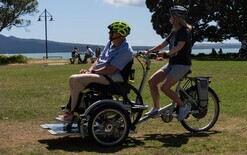‘Clean car’ plans will impact market

Government action on emissions and its fuel-economy standard will be the key issues facing the industry for the foreseeable future.
That’s the view of David Vinsen, chief executive of the Imported Motor Vehicle Industry Association (VIA).
And he warns the government’s current proposals will fail to achieve their aims, will disrupt the industry, and land the market and consumers with price hikes.
With the financial assistance of key stakeholders, VIA has now engaged a professional political lobbyist, Mark Unsworth, and an industry analyst to assist in preparing and advocating its case.
“Through them, we have been able to informally make our case, and present information and data directly to ministers and senior officials,” says Vinsen, pictured, in his annual report to members.
“VIA continues to collaborate with specialist teams from the MoT [Ministry of Transport], NZTA and Climate Change Commission working on these proposals.”
The key elements of the government’s strategy are the fuel-economy standard, officially known as the clean-car import standard, and a feebate incentive and penalty scheme – the clean-car discount.
Vinsen says: “The newly elected Labour government has made it clear that minimising vehicle-related greenhouse gas emissions is a key part of its political agenda.
“Immediately after the election, it resumed work on fuel-economy initiatives with increased urgency.
“VIA has participated in working groups, consultative committees, and has researched and prepared papers on this issue over a number of years with relevant government departments and other industry associations.
“Our position is that we understand, accept and support the government’s commitment to achieving the goals set out in the Paris Climate Agreement.”
However, Vinsen is “very concerned” the current proposals will not only fail to achieve their goals, “but will cause severe disruption and price increases to the market – to the industry and public”.
VIA’s delegation met with the Minister of Transport, Michael Wood, on May 20, and will report on this to members at their AGM, which starts at 2.30pm in the Centenary Lounge, Eden Park, Auckland, on May 26. Unsworth will attend the meeting to report in person.
In his annual report, Vinsen also cites electric vehicles (EVs) as another major issue.
“The rapid uptake of EVs into the fleet is the government’s preferred transport solution to the climate-change issue,” he says. “Used EVs imported continue to exceed new.
“VIA is regularly consulted by officials on various policy options, and has continued to participate in other work on EVs, including the development of standards and curriculum for training of technicians and first responders.”
Changes to biosecurity
Vinsen describes changes to biosecurity processes required by the Ministry for Primary Industries (MPI) last year in response to Covid-19 pandemic as “fundamental”.
He adds they were the cause of “severe disruption” to the used-imports industry.
“At short notice, all Biosecurity NZ officials were brought back from Japan. This required the development of onshore verification procedures to replace long-established procedures in Japan.
“The onshore procedures in New Zealand were originally intended to be temporary in the expectation MPI staff would return to Japan at some stage.
“The temporary nature of the new procedures combined with limited facilities and resources created congestion and delays for shipping lines, ports and logistics companies.
“VIA continued to liaise closely with industry and government agencies to assist in resolving the issue with a ‘NZ Inc’ approach.
“The development of an efficient, effective onshore biosecurity verification system became particularly important once it had been decided that biosecurity officials would not be returning to Japan.
“This revised system is now being implemented progressively with the expectation that delays and costs will be minimised without compromising biosecurity.”
In addition, coronavirus has also impacted on the automotive industry and its supply chain.
When the crisis unfolded, VIA convened, facilitated and chaired work groups comprising key industry experts and government officials as it became obvious the pandemic would materially affect the ability to import, process and sell used vehicles.
These groups have continued to meet as required throughout the various phases of Covid-19 and lockdowns.
Vinsen notes there were “good numbers of vehicles, new and used” imported over the past year, despite disruptions from the effects of Covid-19 regulations.
In the 2020 calendar year, the totals for cars and commercials registered were: 122,127 used, including 3,093 EVs, and 119,411 new, including 2,277 EVs.
Plethora of issues
Over the past year, VIA has also been involved in research, consultations and submissions on many other issues affecting the used vehicle import industry.
The association has a policy of making a submission on all vehicle-related legislation.
In particular, it has dealt with product stewardship in relation to batteries in general and those for EVs, tyres, greenhouse gases, oil and actual vehicles.
Other matters include the 760MHz bandwidth and intelligent transport systems, the Takata airbag recall, vehicle-type approvals, the restricting of motor-industry training restructure, lost or delayed deregistration papers, and entry certification.
Also on the agenda during 2020/21 were proposals to move Ports of Auckland or its car importing activities, implementation of the final phase of the electronic stability control (ESC) rule, “right to repair” and changes to the vehicle inspection requirements manual.
VIA’s research activities have included data from Japan’s Ministry of Land, Infrastructure, Transport and Tourism in regard to fuel-economy standards, and vehicle standards and specifications for ESC.
New approach
VIA was restructured with a revised constitution adopted at a special general meeting last year.
A board of directors was elected with responsibility for issues of governance and finance, while VIA’s council comprises representatives of all tiers of members and has responsibility for industry issues.
The council has met on three occasions with guest speakers on each occasion.
In October, the guest speaker was Andrew Caseley, chief executive of the Energy Efficiency and Conservation Authority.
He gave clear indication of the likely direction and sense of urgency on the development and implementation of the fuel-economy measures under the new government.
In December, Peter Mersi, chief executive of the MoT, continued that theme and spoke about the renewed focus on fuel economy.
In February, Dr Rod Carr, chairman of the Climate Change Commission, gave a presentation on the commission’s report to government.
Vinsen says this focused on opportunities and challenges for the transport sector in general and the motor industry, in particular.
Looking ahead
“In the words of one of our international members some years ago, ‘VIA’s job is to keep the door open for used imports into NZ’,” says Vinsen.
“Our mission statement is that we are committed to supporting and promoting the vehicle import industry.
“This has not changed. In fact, the events of the past 12 months have highlighted the continued need for VIA and its services. It continues to be the only effective voice for the used-import trade.
“The restructured association is now well-placed to continue to advocate for and represent the industry, and personally I am very positive about VIA’s new phase.”





